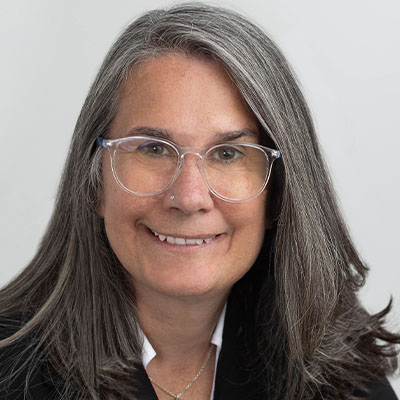President
Dr. Linda J. Kligman is intrigued by the study and implementation of relational approaches to creating more inclusive and participatory workplaces. As President of the IIRP, she provides leadership for the graduate school, fostering a climate that nurtures respect, innovation, collaboration, and excitement.
Linda earned a Doctor of Philosophy in Interdisciplinary Studies from Union Institute and University with a concentration in Ethical and Creative Leadership and a specialization in Martin Luther King, Jr. Studies. Her dissertation, Widening Circles: A Grounded Theory Study of Workplace Leadership, received two honors from Union Institute and University: The Marvin B. Sussman Award for originality, interdisciplinarity, and social relevance in scholarship, and the Virgil A. Wood Award for excellence advancing King’s work. Her dissertation research utilized grounded theory to examine restorative practices within organizational leadership. She holds a Bachelor of Science in Civil Engineering and Appropriate Technology, both from Drexel University, and a Master of Science in Restorative Practices from the IIRP Graduate School.
Linda has been with the IIRP with increasing responsibility since 2010 most recently serving as the Vice President for Administration prior to becoming the President. Beyond that, she has two decades of experience in community leadership and raising resources for purposes dear to her heart. She worked with LaSalle University’s Nonprofit Center as a development consultant, was principal of a marketing firm, executive director of a community-revitalization agency, and has won regional awards for successful fundraisers supporting critical social services. Even more dear to her heart are her relationships as mother, daughter, partner, stepmom, sister, colleague, and friend.
Linda's publications:
Kligman, L. (2024). Heart strong work: Improving workplace culture. IIRP Graduate School.
Kligman, L., Mui J, McClendon H., & Garcia Mencos, F. (2023). The reciprocity of dignity: Transforming us/them narratives through inclusive dialogue. In J. Barnes, M. J. Stevens, B. Z. Ekelund & K. Perham-Lippman (Eds.), Inclusive leadership: Equity and belonging in our communities. (pp. 233-244). Emerald Publishing Limited, Bingley. https://doi.org/10.1108/S2058-880120230000009021
Kligman, L. (2023). Widening circles: Workplaces applying restorative principles. In H. Vah Seliskar (Ed.),Restorative justice and practices in the 21st century(pp. 1-23).IGI Global.https://doi.org/10.4018/978-1-6684-6145-7.ch001
Kligman, L., & Abdul Rahim, R. B. (2023). Democratizing leadership-followership: Restorative practices in the age of disruption. In S. K. Dhiman, J. Marques, J. Schmieder-Ramirez, & P. G. Malakyan (Eds.), Handbook of global leadership and followership: Integrating the best leadership theory and practice (pp. 1–24). Springer. https://doi.org/10.1007/978-3-030-75831-8_5-1
Kligman, L. (2022, August 25). Changing agendas: Rethinking followership to improve leadership meetings. PAUSE for Pedagogy. International Leadership Association. https://ilaglobalnetwork.org/newsletter/changing-agendas-rethinking-followership-to-improve-leadership-meetings/
Kligman, L. (2021). Engaging for positive peace. Penumbra: An Interdisciplinary Journal of Critical and Creative Inquiry, 8 (Summer), 3–13. https://unionpenumbra.org/article/engaging-for-positive-peace/
Kligman, L. (2021). Sparking creativity: Workplace applications of restorative practices. IIRP Presidential Paper Series, 3, 1-22. https://www.iirp.edu/pps3

